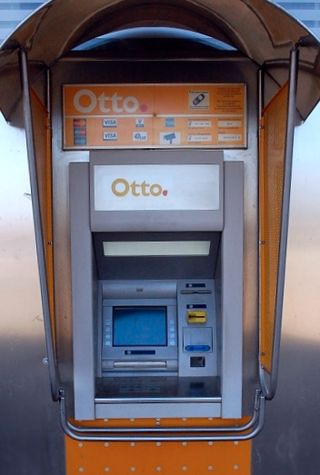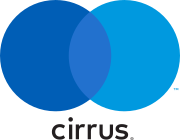
A debit card, also known as a check card or bank card, is a payment card that can be used in place of cash to make purchases. The card usually consists of the bank's name, a card number, the cardholder's name, and an expiration date, on either the front or the back. Many new cards now have a chip on them, which allows people to use their card by touch (contactless), or by inserting the card and keying in a PIN as with swiping the magnetic stripe. Debit cards are similar to a credit card, but the money for the purchase must be in the cardholder's bank account at the time of the purchase and is immediately transferred directly from that account to the merchant's account to pay for the purchase.

Electronic Funds Transfer at Point Of Sale, abbreviated as EFTPOS, is the technical term referring to a type of payment transaction where electronic funds transfers (EFT) are processed at a point of sale (POS) system or payment terminal usually via payment methods such as payment cards. EFTPOS technology was developed during the 1980s.

Mastercard Inc., stylized as MasterCard from 1979 to 2016 and as mastercard from 2016 to 2019, is an American multinational payment card services corporation headquartered in Purchase, New York. It offers a range of payment transaction processing and other related-payment services. Throughout the world, its principal business is to process payments between the banks of merchants and the card-issuing banks or credit unions of the purchasers who use the Mastercard-brand debit, credit and prepaid cards to make purchases. Mastercard has been publicly traded since 2006.

Visa Plus is a worldwide interbank network that provides cash to Visa cardholders. As a subsidiary of Visa Inc., it connects all Visa credit, debit and prepaid cards, as well as ATM cards issued by various banks worldwide bearing the Visa / Electron logo.

Visa Electron was a debit card product that used the Visa payment system. It was offered by issuing banks in every country with the exception of Canada, Australia, Argentina, Ireland and the United States. The difference between Visa Electron and Visa Debit, a similar product, is that payments with Visa Electron always require on-line electronic authorisation, and typically require that all the funds be available at the time of transfer, i.e., Visa Electron card accounts may not normally be overdrawn. Most Visa Debit cards, on the other hand, may be processed offline, without online authorisation, and may allow transfers exceeding available funds up to a certain limit. For that reason, Visa Electron cards are more commonly issued to younger customers or customers that have poor credit. Online stores and all offline terminals do not support Visa Electron because their systems cannot check for the availability of funds. In addition to point of sale debit payments, the card also allows the holder to withdraw cash from automated teller machines (ATMs) using the Plus interbank network.

Visa Debit is a brand of debit card issued by Visa in many countries. Numerous banks and financial institutions issue Visa Debit cards to their customers for access to their bank accounts. In many countries the Visa Debit functionality is often incorporated on the same plastic card that allows access to ATM and any domestic networks like EFTPOS or Interac.
Expressnet is an interbank network connecting the ATM networks of seven major banks in the Philippines. It has the second-largest number of ATMs and the smallest number of customers and member banks. However, its strength among the interbank networks and the ubiquity of BPI ATMs have given birth to the Expressnet motto: "The Powerful Connection".
BancNet is a Philippine-based interbank network connecting the ATM networks of local and offshore banks, and the country's single interbank network in the Philippines in terms of the number of member banks and annual transactions. Due to its status as the country's single ATM switch operator, it is designated by the Bangko Sentral ng Pilipinas (BSP) as the country's national ATM network.
Seven Bank, Ltd. is a Japanese bank. It is a subsidiary of Seven & I Holdings Co., Ltd.. Until October 11, 2005, it was IY Bank, taking its initials from Ito Yokado. Conducting its business primarily through the Internet, IY Bank has automatic teller machines in 7-Eleven convenience stores and Ito Yokado general-merchandise stores in Japan, and on April 27, 2005, opened its first branch with live staff. Customers with accounts at certain banks can process transactions at IY terminals at no cost; IY collects a handling fee from customers at other banks.
The Saudi Payments Network or mada is the major payment system in Saudi Arabia. Established by Saudi Central Bank (SAMA), it connects all ATM and point of-sale (PoS) terminals throughout the country to a central payment switch, which in turn re-routes the financial transactions to the card issuer. All banks in Saudi Arabia are required by the Saudi Central Bank (SAMA) to issue ATM cards that are fully compatible with the network. All services are provided to the customer free of charge, regardless of the ATM that is used, its operator, or the customer's card issuer.
An interbank network, also known as an ATM consortium or ATM network, is a computer network that enables ATM cards issued by a financial institution that is a member of the network to be used to perform ATM transactions through ATMs that belong to another member of the network.
ATM usage fees are what many banks and interbank networks charge for the use of their automated teller machines (ATMs). In some cases, these fees are assessed solely for non-members of the bank; in other cases, they apply to all users. There is usually a higher fee for the use of White-label ATMs rather than bank-owned ATMs.

Otto. is Finland's interbank network, connecting the ATMs of nearly every bank in the country. It is owned and operated by Automatia. They offer service in Finnish and Swedish, but also in English to holders of international ATM cards. The word "Otto" means "withdrawal" in Finnish, and is also a relatively common given name. The withdrawal points use machines from two different equipment manufacturers: NCR's Scottish subsidiary and German Wincor Nixdorf. The software and the new chip card readers have been supplied by Fujitsu Finland, and the information system is in charge of Tieto-Evry.

The CB Bank Card Group, also known as simply CB, is France's national interbank network, with over 46,000 ATMs and over 1 million EFTPOS acceptance points.

Eurocard was a credit card, introduced in 1964 by Marcus Wallenberg Jr. of the Wallenberg family as an alternative to American Express. In 1968, it signed a deal with the Interbank Card Association so that their cards were accepted by each other's networks; this eventually led to a joint venture known as Maestro International in 1992, and merger in 2002.

EUFISERV is a European interbank network connecting the ATMs of savings banks in Austria, Belgium, the Czech Republic, Finland, France, Germany, Italy, the Netherlands, Norway, Portugal, Spain, Sweden, and Switzerland. It is the largest and the only international credit union-owned interbank network in Europe.

girocard is an interbank network and debit card service in Germany connecting virtually all automated teller machines (ATMs) and banks. It is based on standards and agreements developed by the German Banking Industry Committee.

Debit Mastercard is a brand of debit cards provided by Mastercard. They use the same systems as standard Mastercard credit cards but they do not use a line of credit to the customer, instead relying on funds that the customer has in their bank account.

Worldpay is an American multinational financial technology company and payment processing company. Worldpay provides payment and technology services to merchants and financial institutions globally generating 40 billion transactions across 146 countries and 135 currencies.

The ATH/A Toda Hora S.A. Network is an interbank network connecting the ATMs of various financial institutions in Colombia.

















